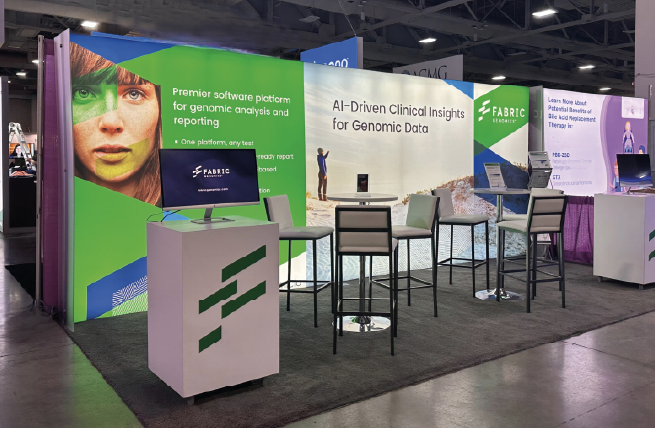Meet Us at ACMG 2025
Los Angeles, California
March 19-21, Booth #415
Join our expert team at ACMG and discover the latest AI-driven end-to-end clinical sequencing solutions that are scaling genetic testing for our partners.
 Helping You Scale Rapid, Accurate Genetic Testing
Helping You Scale Rapid, Accurate Genetic Testing
Visit us at Booth #415 and discover how we’re helping clinical genomics partners scale rapid, accurate genetic testing services.
✔️ AI enabled analysis workflows
✔️ Accurate and rapid results
✔️ Competitive pricing
✔️ A sequencing technology agnostic platform
 Theater Presentation
Theater Presentation
Thursday 20/03, 12:30 – 1:00PM, Theater #2
Why AI Matters in Today’s Clinical Genomics – Accelerating Testing with Fabric GEM, a Cutting-Edge and Clinically Proven AI Tool
Dr. Mark Yandell (co-founder of Fabric Genomics and Professor of Human Genetics, School of Medicine, University of Utah) will present major AI-based advances in two areas: identifying newborns likely to benefit from rapid genome sequencing (Mendelian Phenotype Search Engine, MPSE) and population screening for monogenetic diseases with high accuracy using an in silicon genetic analyst named Transformer. Dr. Samuel Strom (VP Clinical Operations at Fabric) will discuss how his team uses new technology every day to deliver rapid molecular testing.
 Poster Presentation
Poster Presentation
Friday 21/03, 10:30 – 11:30AM
AI-supported Identification of Disease-Gene Relationship Publications
Since the initial implementation of genome-wide diagnostic sequencing – including whole exome sequencing (WES) and whole genome sequencing (WGS) – the pace of novel disease-gene relationship (GDR) discovery has been rapid and consistent. Every month, peer-reviewed scientific journal articles are published containing novel GDRs, but there is no systematic mechanism centralizing these findings. GDR databases currently available – including OMIM, ClinGen, theGenCC, PanelApp (UK and Australia), and DECiPHER – rely heavily on human curation of literature. These efforts are predominantly volunteer-based and thus cannot be depended upon to be timely or comprehensive. As laboratories and scientists evaluating genetic test results depend on accurate GDR information, the information gap between published articles and GDR databases creates risk for false negative results and increases the manual workload on the genomics workforce


